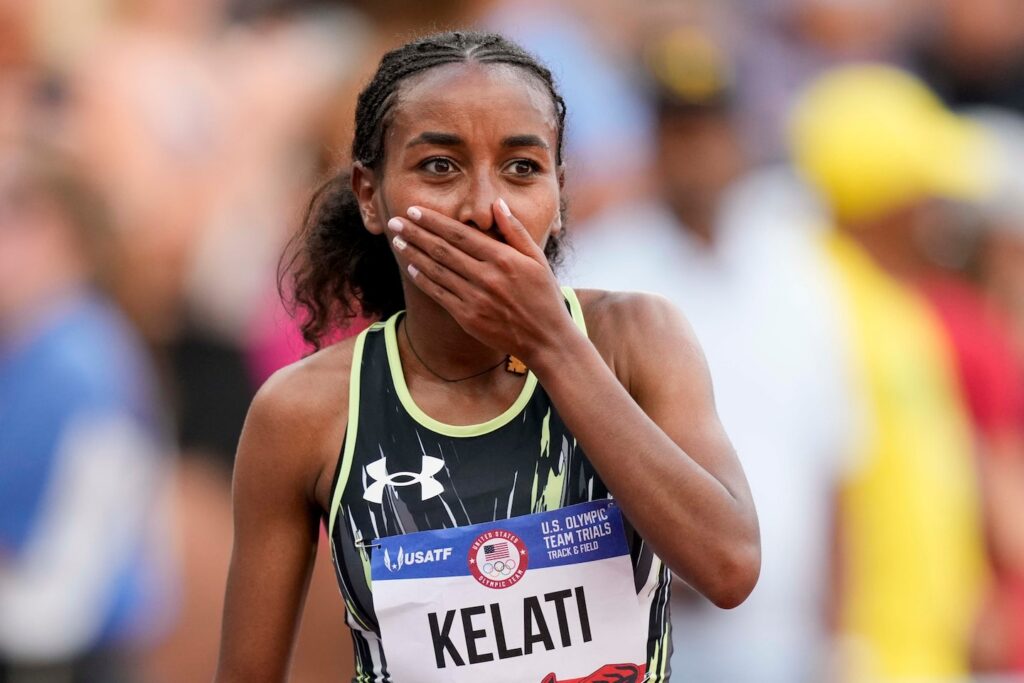“Every time I come here it brings back memories,” Kelati said. “I get very emotional and it affects my racing. This time I told myself, 'I have to become a new me. I have to forget everything that happened in the past and focus on the present.'”
On Saturday night, Kelati stood on the starting line of the 10,000 meters at the U.S. Olympic Trials with a renewed sense of self. She was almost certain to be an Olympian regardless of the outcome, but she wanted to win. On the final lap after 30 grueling minutes of running, Kelati surged to the front, fell behind, surged back to the front again. She crossed the line first. She pushed the memories away.
Kelati completed her victory lap carrying a small American flag. She will compete in the Paris Olympics next month with “USA” written across her chest, another test of the remarkable story that began in Eugene.
In 2014, at age 17, Kelati competed in the Youth World Championships in Eugene, representing her native Eritrea, which human rights groups consider one of the most repressive countries on earth, from which thousands of people flee each year to seek asylum.
Kelati was one of them. She called her family and tearfully told them she couldn't return home. She defected to the United States, moving to the suburbs of Leesburg, Virginia, to live with her third cousin, Amlethom Tekrai, a long-distance runner at Stephen F. Austin University.
Kelati was a star athlete at Heritage High School and a 13-time All-American in cross country and track and field at the University of New Mexico. In 2021, she became a U.S. citizen three days before the 10,000-meter race at the Olympic Trials. Her flight landed two days before the race. “I was so excited I couldn't sleep,” Kelati said. The heat and the exhaustion of the trip left Kelati weak and unable to complete the race.
Kelati came to Eugene again hoping to win, even though she had all but secured an Olympic spot. She was the only runner in this race to run the Olympic standard time. The only way she wouldn't make the Olympic team would be if an unlikely series of events occurred: if she didn't finish in the top three and all three podium finishers recovered quickly enough to run the standard time within a few weeks.
Kelati didn't care about that.
“No matter how tough the race was, I was just thinking about winning the race,” Kelati said.
Before Kelati stepped onto the starting line, her coach, Steven Haas, told her, “Whatever you do, do it your way.” As a professional, the 27-year-old Kelati has struggled to live up to her own expectations. This year, she told herself to do her best and accept the results. This is another characteristic of the new Weini Kelati.
“Even though I've done well and I've set personal bests, I still don't feel like it was enough because I fell short of my goal,” Kelati said. “That's really tough. It's mentally tough when you're like, 'Oh, I don't know if my sponsors are happy with this,' and it ruins everything I've worked for. So this year, I said, 'OK.'
Kelati told herself to be patient and save her energy for the final push, which had been her training focus. Kelati was close to the leaders for the first 7,000 meters, then surged to third place. Kelati, Florida rookie Parker Valby, and Olympian Carisa Schweitzer all pulled away from the pack until the final lap, when Kelati ran third.
With 300 meters to go, Kelati passed Valby for second place. She passed Schweitzer with 200 meters to go. Schweitzer attacked with 150 meters to go and passed Kelati to regain the lead. With another 50 meters to go, with a grimace on her face, Kelati surged up the inside of Schweitzer, overtaking him and finally pulling away to finish in 31:41.07. Kelati hunched over and put her hands on the back of her head.
“I knew I was going to do it,” Kelati said. “But at the same time, it was an incredible feeling.”
Kelati will continue her journey all the way to Paris. Three years ago, she could have obtained citizenship and run for another country, a reasonable choice given the hurdles involved in getting citizenship. She decided to either run for the U.S. or not run at all.
“It's an honor every time I put on the USA uniform and go out and race,” Kelati said. “I feel like I can go out there and race the best race of my life.”
Kelati will still be thinking about the place she left; the memories can be suppressed, but they never go away. Every time she runs, Eritreans reach out to her. “They're watching,” Kelati says. “Every time I race, wherever I go, they follow me. They watch my races. They come to see me in Paris.”

